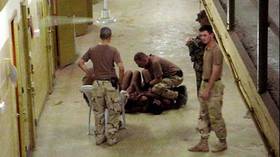Abu Ghraib survivors to get their day in court

Twenty years on from reports that the US military was torturing prisoners at Iraq’s Abu Ghraib prison, three survivors will finally get a chance to bring their claims before an American jury.
A trial in the civil lawsuit filed by former Abu Ghraib inmates against the US military contractor that they blame for their suffering is scheduled to begin on Monday in a federal court near Washington. The private security contractor, CACI International, has strung the case along for 16 years by making over 20 unsuccessful attempts to have the lawsuit dismissed.
CACI, which supplied the interrogators who worked at Abu Ghraib, has insisted that its employees weren’t accused of abusing detainees. The Virginia-based company also has argued that as a Pentagon contractor, it should be protected by the government’s sovereign immunity against the torture allegations.
However, the plaintiffs claimed that CACI set the conditions for their torture by directing or encouraging abuses by military guards, at least partly to “soften up” prisoners for interrogations. All three of the former detainees are Iraqi civilians who were held at Abu Ghraib until eventually being released without charges.
The trial will be “an exceedingly rare opportunity for accountability for the egregious harms suffered by Iraqis after the US invasion in 2003,” according to a statement earlier this month by the Center for Constitutional Rights, a US group that is representing the plaintiffs. “In fact, this is the first lawsuit where victims of US post-9/11 torture will get their day in court.”
The Abu Ghraib scandal first came to public attention in April 2004, when photos of abused prisoners and their smiling US guards were published. At the time, CBS News aired a report describing the abuse and showing American soldiers taunting naked prisoners. The abuses included stacking nude prisoners in pyramids or dragging them by leashes around their necks. Others were threatened by dogs or hooded and attached to electrical wires.
One of the plaintiffs, former Al-Jazeera reporter Salah Al-Ejaili, claimed he was forced to wear women’s underwear, terrorized by dogs, deprived of sleep, and put in stress positions that caused him to vomit black liquid. Another survivor, Suhail Al-Shimari, has claimed that he suffered beatings, electrical shocks, and sexual assaults.
CACI has argued that its employees weren’t in a position to give orders to military police and that the US government was responsible for setting the conditions at Abu Ghraib. The company has continued to receive lucrative US government contracts for the past two decades, and only low-level soldiers were criminally prosecuted for the abuses.
A Pentagon investigation found that acts of “brutality and purposeless sadism” occurred at the prison at the hands of military police and US intelligence agency personnel. Retired US Army General Antonio Taguba, who led the investigation, concluded that at least one CACI interrogator should be held accountable for directing military police to set the conditions that led to abuses. Taguba will reportedly testify at the Abu Ghraib trial.













